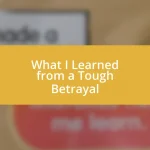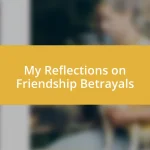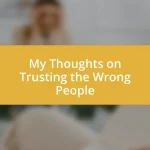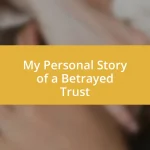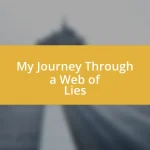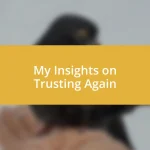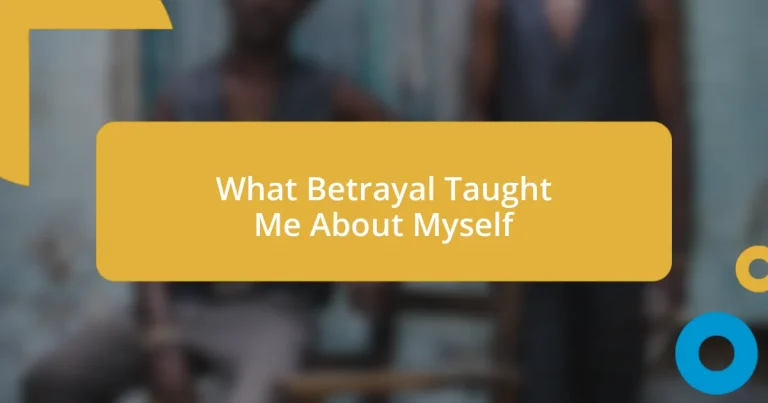Key takeaways:
- Betrayal serves as a profound teacher, prompting self-reflection on personal values, boundaries, and emotional needs.
- Building emotional resilience involves embracing discomfort, practicing self-care, and surrounding oneself with supportive relationships.
- Finding closure is about accepting past hurts, reframing painful memories as lessons, and opening up new opportunities for growth and connection.
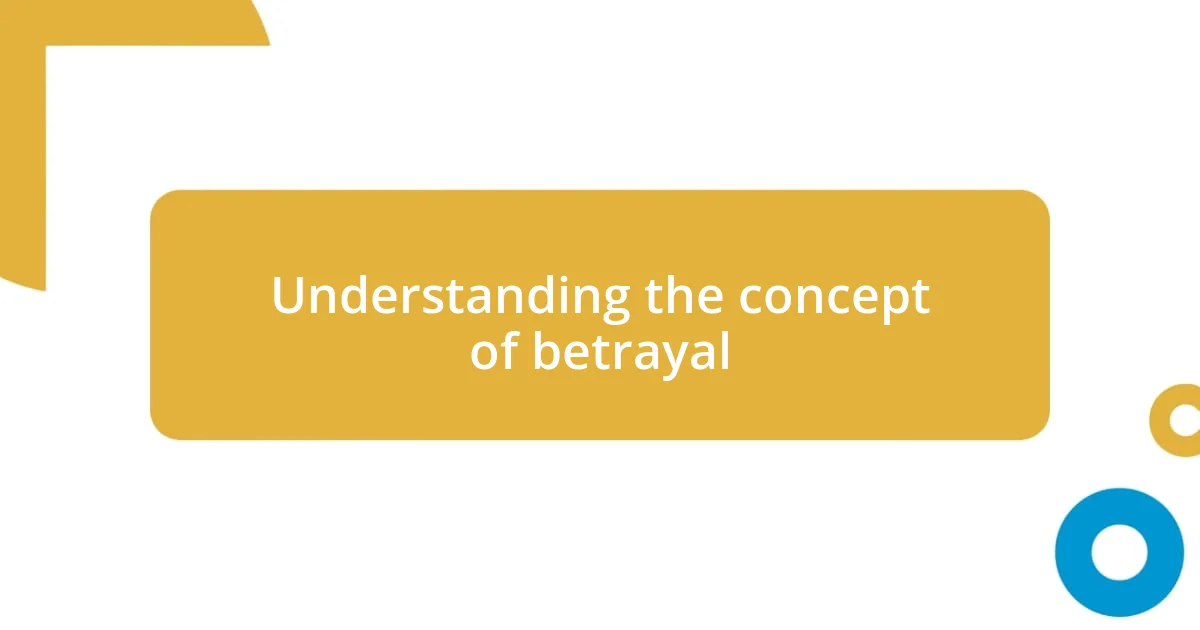
Understanding the concept of betrayal
Betrayal, at its core, is an emotional wound that can cut deeper than any physical injury. I remember a moment when a trusted friend shared a private struggle of mine with others. In that instant, the realization hit me hard: betrayal isn’t just about broken trust; it’s about feeling exposed and vulnerable.
Have you ever found yourself questioning not just the other person’s intentions but also your own judgment? I’ve grappled with this after discovering deceptive actions in relationships I held dear. It’s like a snowball effect; as my trust eroded, I also began to wonder if I was reading situations wrong all along.
When I reflect on betrayal, I recognize that it can serve as a profound teacher. Instead of seeing it solely as a heartbreak, I’ve learned to view it as a mirror reflecting my own values and boundaries. Each betrayal pushed me to define what I truly want from relationships and what I won’t tolerate, ultimately helping me grow stronger and more self-aware.
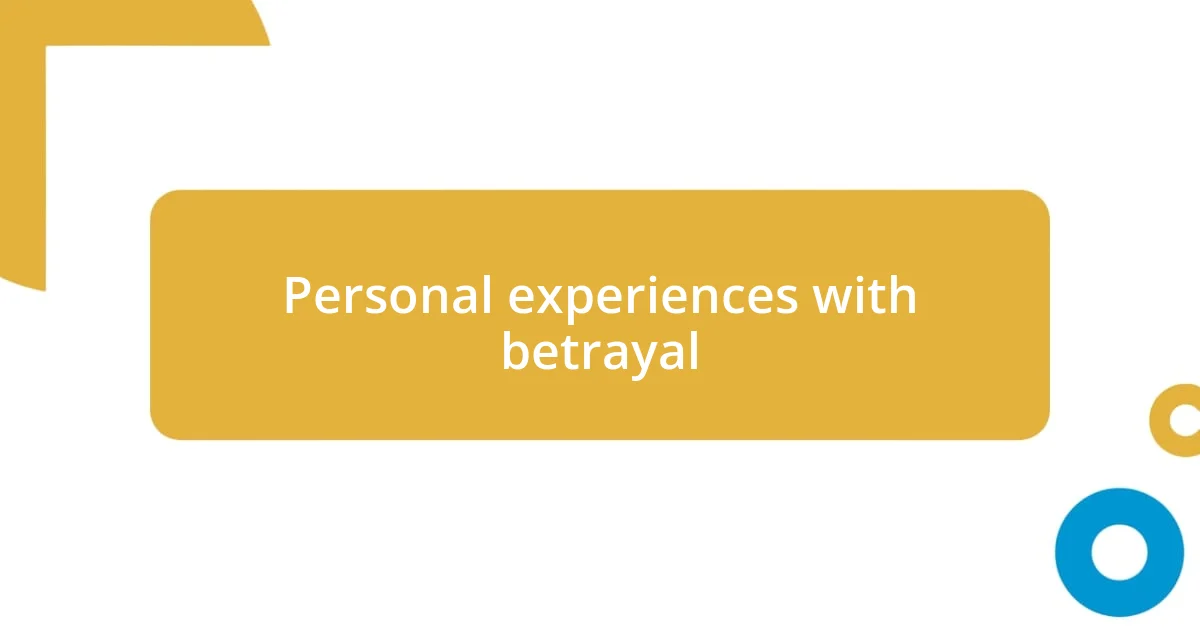
Personal experiences with betrayal
Betrayal often comes from those we least expect. I distinctly remember the moment I discovered a coworker had undermined my efforts in a team project. That feeling of shock and disappointment was palpable, as if a rug had been pulled out from under me. In that instant, I learned that betrayal could also be a powerful awakening, urging me to reassess my professional relationships.
There was another experience that shook me to my core: finding out that someone I loved had been dishonest about their feelings. I was devastated, not just by the lie, but by how it impacted my self-worth. It forced me to ask harsh questions: Did I overlook signs? Was my intuition failing me? In this introspection, I found that betrayal, while painful, pushed me towards a deeper understanding of my own emotional needs and resilience.
Reflecting on both of these experiences, I realize that betrayal is like a harsh teacher. While its lessons are often hard to bear, they can guide us toward better self-awareness. After all, each betrayal has shaped how I navigate relationships today, reinforcing my values and helping me forge boundaries with clarity and confidence.
| Experience | Insight Gained |
|---|---|
| Loss of trust from a coworker | Awareness of professional dynamics |
| Dishonesty from a loved one | Understanding of my emotional needs |
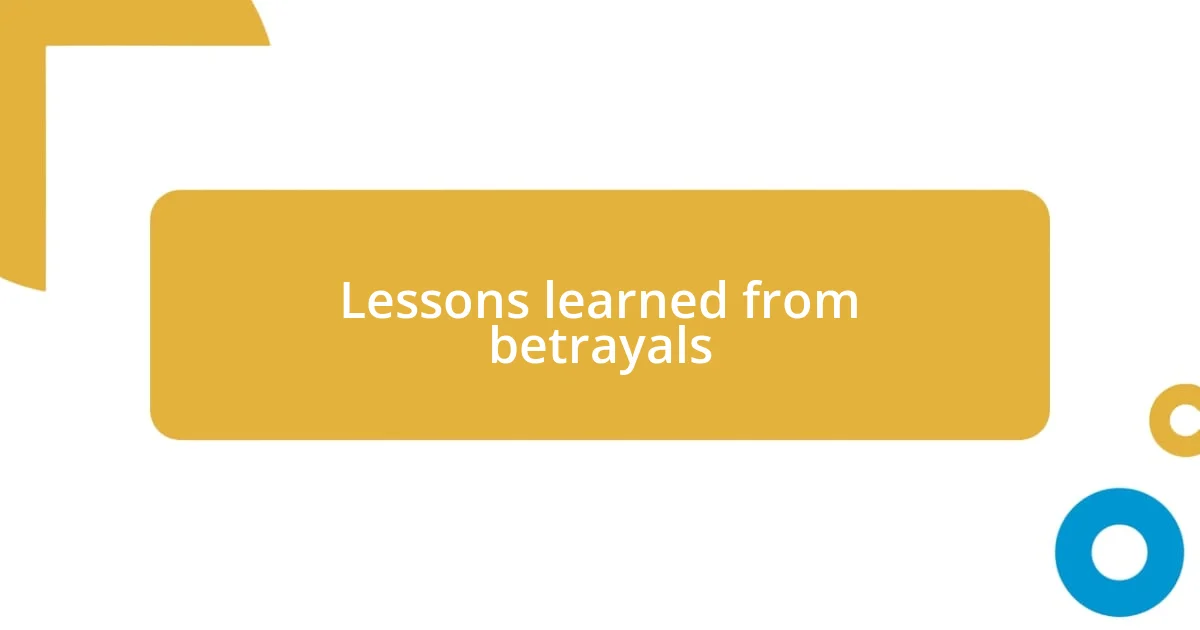
Lessons learned from betrayals
Experiencing betrayal has taught me valuable lessons about myself that I didn’t expect to uncover. One striking realization was how important it is to trust my instincts. After being blindsided by a friend who let me down, I took a step back to reflect. I realized I often dismissed my gut feelings in favor of giving others the benefit of the doubt. This made me more mindful about paying attention to those initial vibes moving forward.
Here are some key lessons I’ve learned from betrayal:
- Trust your instincts: They often pick up on red flags before you consciously recognize them.
- Re-evaluate relationships: Betrayal can be a catalyst for assessing who truly deserves a place in your life.
- Strengthen boundaries: I discovered that setting clear boundaries is essential for protecting my emotional well-being.
- Embrace resilience: The process of recovering from betrayal has made me tougher, teaching me that I can emerge from hardship with greater strength.
- Understand your worth: Betrayal forced me to confront my own self-esteem and reinforced that I deserve respect and honesty.
In another instance, after experiencing betrayal in a community I once felt safe in, I found myself evaluating what that space truly represented for me. I realized that the culture of trust I craved was built through mutual respect and open communication. This epiphany prompted me to communicate more openly and seek environments that aligned with those values, which has been liberating. This shift taught me that the fallout from betrayal can lead to unexpected growth and deeper connections, if I’m willing to embrace the lessons rather than dwell on the pain.
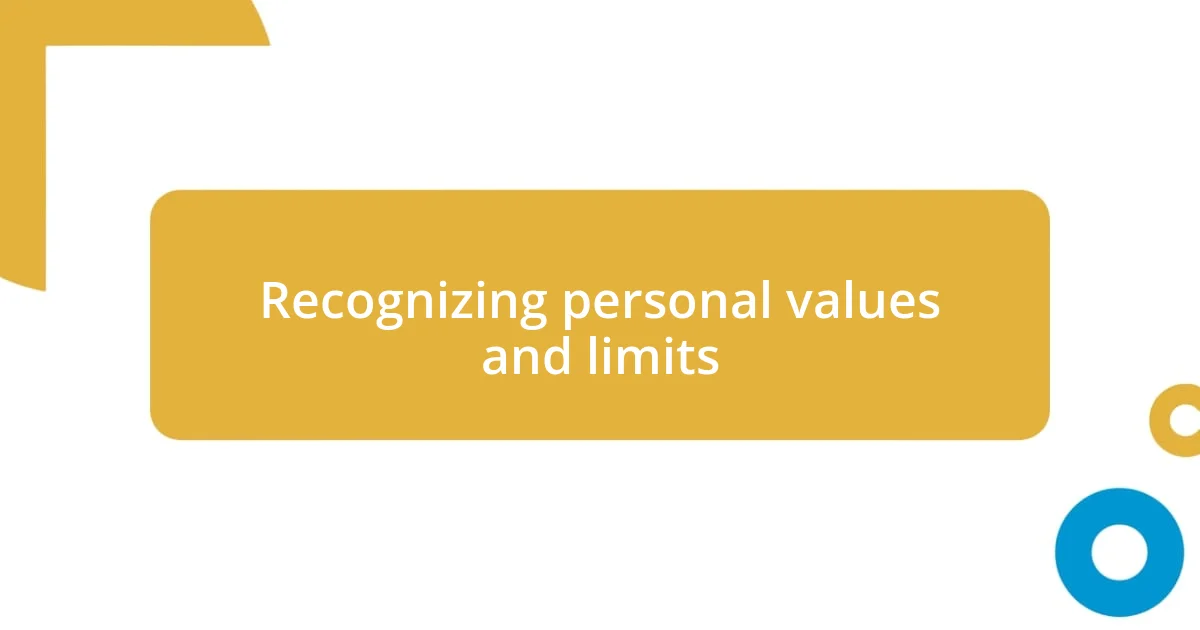
Recognizing personal values and limits
Recognizing my personal values and limits has been a transformative journey, often illuminated by moments of betrayal. For instance, after realizing a friend had shared my secrets without my consent, I felt an overwhelming sense of vulnerability. I began to ask myself: What do I truly value in relationships? This introspection led me to redefine what trust meant to me and establish firmer boundaries moving forward.
I also discovered that limits aren’t just about saying “no”; they are about honoring my well-being. When I found myself stretched too thin by accommodating others, I felt resentment bubbling beneath the surface. I had to reflect on my capacity and learn that it’s okay to prioritize my needs without guilt. Setting limits became not just a protective measure but a statement of self-respect.
As I’ve navigated these experiences, I’ve come to understand that personal values and limits serve as my emotional compass. I recall a time at work when I had to voice my discomfort about a colleague’s unethical behavior. It was uncomfortable, but affirming my values in that moment was liberating. I realized that embracing my principles empowers me to foster healthier connections and cultivate environments that resonate with my true self.
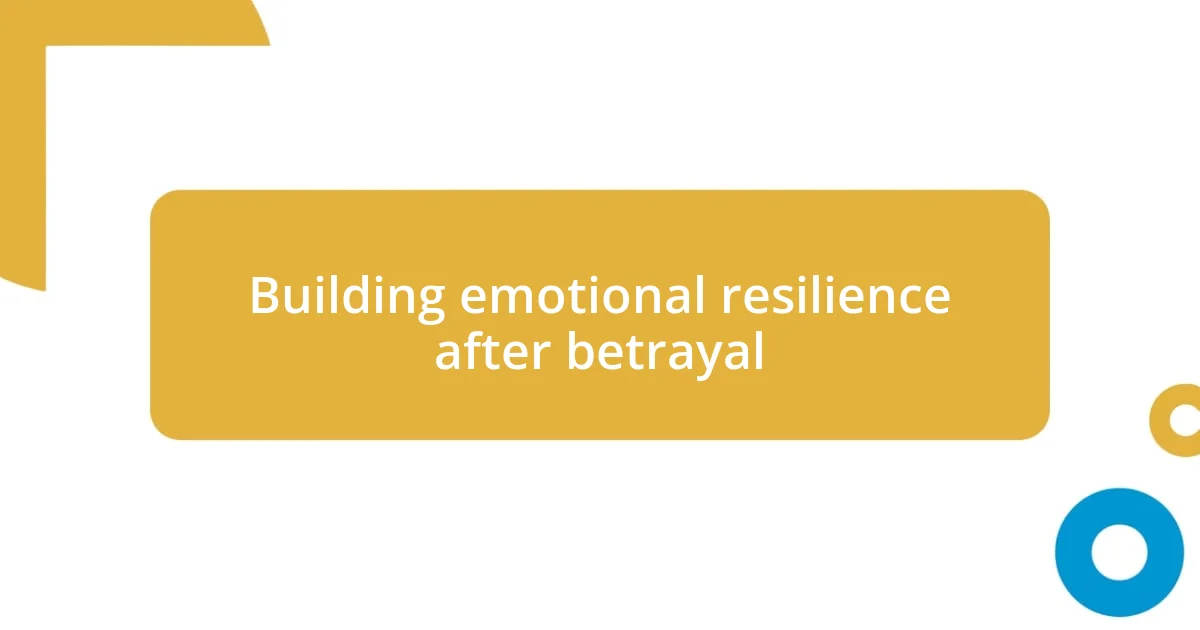
Building emotional resilience after betrayal
After facing betrayal, I found myself at a crossroads, grappling with feelings of shock and anger. One personal insight I had was that these feelings, while painful, could actually fuel my resilience. I started asking myself what strength truly meant to me. I realized that embracing the discomfort of my emotions, rather than suppressing them, allowed me to process the experience and transform my pain into power.
In my journey toward emotional resilience, I discovered the importance of self-care. There was a time when I wrote in a journal every night, reflecting on my feelings and processing emotions that seemed too overwhelming to share with anyone else. This small act became a release; it helped me articulate my heartache and ultimately guided me to discover the kind of support I truly needed. Taking time for myself made me appreciate the healing process; it wasn’t about rushing to feel better but rather allowing myself the grace to grow through it.
I also learned how essential it is to surround myself with supportive people. One evening, after confiding in a close friend about my experiences, I felt an overwhelming sense of relief wash over me. I realized that vulnerability is not a weakness; it’s a bridge to genuine connection. This reinforces my understanding that resilience is deeply tied to the relationships I cultivate. How can we truly heal if we don’t share our burdens with others? I know that having a strong support network has been pivotal in my recovery, reminding me that we don’t have to navigate our pain alone.
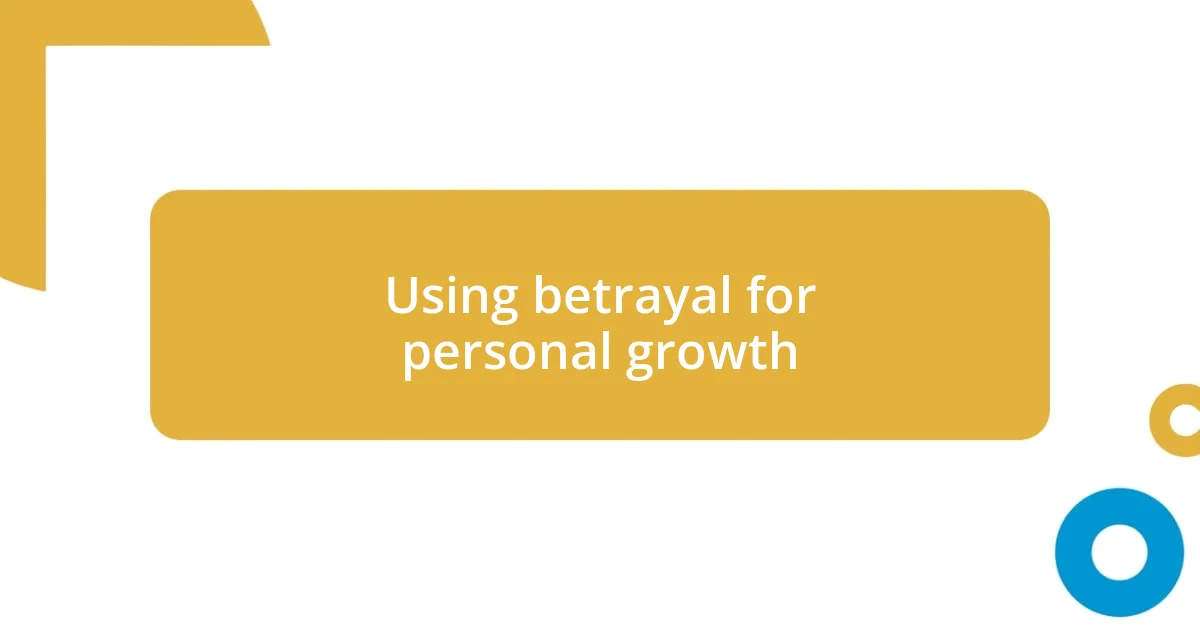
Using betrayal for personal growth
Using betrayal as a catalyst for personal growth is something I never anticipated. I remember a time when a trusted colleague undermined my efforts during a team project, leaving me feeling isolated and betrayed. In the aftermath, I asked myself: How can I turn this negative experience into a learning opportunity? That reflection sparked my desire to focus on building stronger, more transparent communication with my team moving forward.
In the depths of betrayal, I stumbled upon a deep reservoir of inner strength I didn’t know I had. After being let down by someone I confided in, I decided to channel that hurt into a newfound passion for self-improvement. I enrolled in workshops to enhance my leadership skills, knowing that mastering my own voice would help prevent similar feelings of powerlessness in the future. I learned that each setback can illuminate a path to advancement, so why not embrace the journey of growth instead of dwelling on the pain?
Transformation often comes in unanticipated ways. One day, after experiencing betrayal, I went for a long hike to clear my mind. As I climbed, I pondered the idea that the mountains represented the hurdles I faced. Each step felt heavy at first, but with every ascent, I felt lighter. In those moments, I realized that betrayal can act as a wake-up call to pursue my goals with renewed vigor. Why let hurt define me when I can use it as motivation to rise even higher?
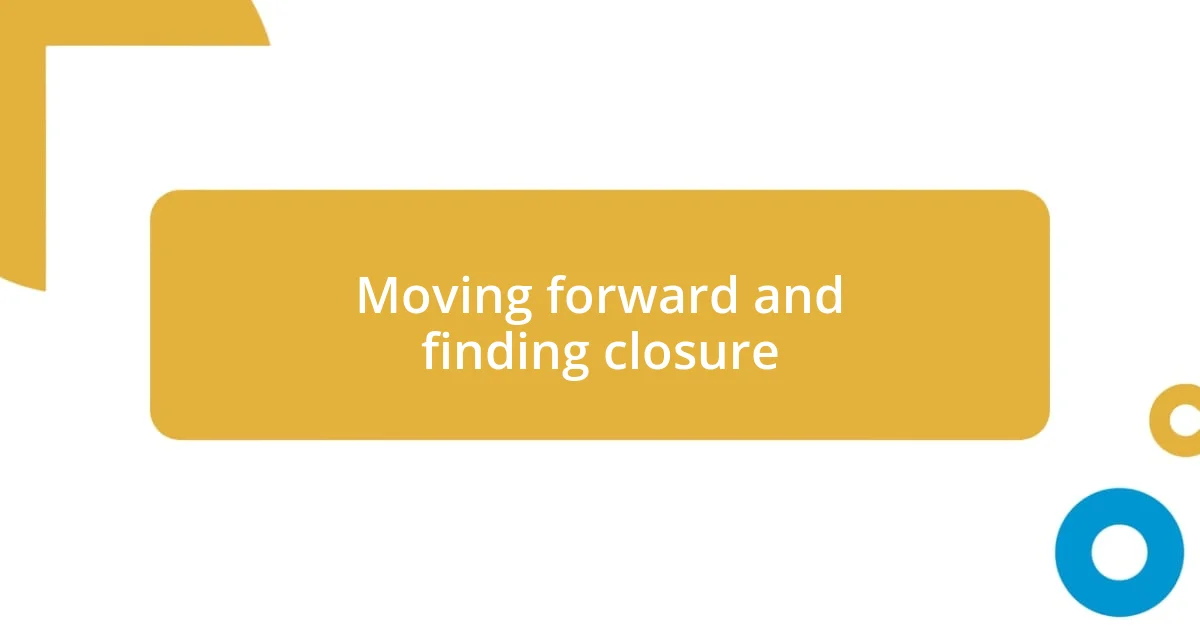
Moving forward and finding closure
Finding closure after a betrayal has been a deeply personal journey for me, often filled with quiet moments of reflection. I remember sitting on my porch one evening, watching the sunset wash over the sky, and feeling an unexpected sense of peace. It struck me then that closure isn’t about forgetting the hurt; it’s about accepting it and granting myself permission to move forward. Have you ever paused to acknowledge how far you’ve come? It’s these little realizations that can lead to profound healing.
In my experience, closure also means revisiting painful memories with a new perspective. I recall going through old messages from the person who betrayed me, feeling a mix of anger and understanding. Instead of lingering on the betrayal, I began to see these memories as lessons rather than wounds. Each time I faced those uncomfortable emotions, I found a little more clarity and strength. Isn’t it remarkable how confronting our past can bring us closer to understanding ourselves?
Ultimately, I’ve learned that moving forward often brings an abundance of new opportunities. After coming to terms with my experience, I started to set new goals that aligned with my values and passions, which felt invigorating. I began volunteering in my community, finding joy in connecting with others who were healing. In many ways, closing that chapter of my life has opened up a whole new narrative that I couldn’t have envisioned otherwise. What if our most challenging moments are really just invitations for something greater?
